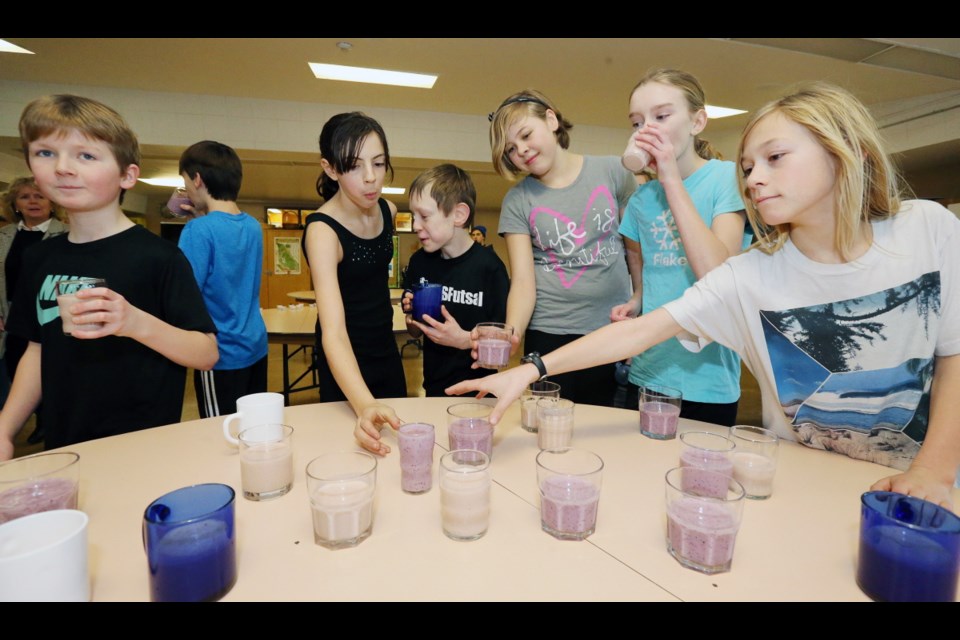A View Royal School has blasted its marks upward, significantly improved attendance and behaviour, and has done it all with exercise and smoothies.
Since September 2013, Ecole Shoreline Community Middle School has started the day with a 20-minute physical activity and followed up with a nutritious snack, such as a healthy smoothie, nuts or fruit.
Since the beginning of the program, called ABL for Activity Before Learning, average academic performance has leaped a stunning 21 per cent.
Meanwhile, the number of kids sent to the office for discipline has gone from a daily average of 17 to fewer than three. Late arrivals have decreased by 82 per cent and absences have gone down by 46 per cent.
“It’s pretty impressive,” said vice-principal Jeff Duyndam. “And we attribute it mostly to the exercise and the food.”
Shoreline initiated the exercise-and-snack morning routine as part of an overall pilot program created in partnership with Island Health called Health Promoting Schools.
The View Royal program is mandatory for its 600 students in grades 6, 7 and 8. The only exceptions are the small number of kids who, for things such as medical reasons, can’t take part — and even they are assigned to helping fix the snacks.
Duyndam said by now, most students have taken to showing up to school in their gym strip and then getting changed into street clothes before classes.
Days start with one of five different exercise routines: An outdoor run, a series of co-ordinated sprints and exercises called a “beep test,” a relay run in the gym, a blacktop game such as tag, and circuit training moving from station to station.
Also, three times a month the school population engages in something called “Hallway Madness.” Students dash through the hallways, hitting various stations before it’s all over. It’s perhaps the only time any of the kids have been encouraged to run in the halls.
“The students are all just running through the hallways and they just love it,” Duyndam said.
He said the school population is a mixed bunch, including about 40 per cent attending French immersion and 30 per cent First Nations kids. And so far, parents are enthusiastic.
“Parents are thrilled with the program,” said Duyndam. “They notice their kids are going to bed earlier, sleeping through the night more often, sleeping longer.”
“We have had some real positive responses from parents and that excites us,” he said.
It’s hoped kids will eventually learn to appreciate daily routines divided by physical activity, healthy food and work time.
“It’s all about developing healthy habits that continue into the adult years,” said Duyndam. “We hope they can get to a point where, when they stop, they will notice a difference in how they are feeling and will crave to start up again.”
He also said as an experienced educator the results of the program aren’t a surprise. But everyone should expect the outcome.
“All the research on physical activity shows it improves memory, decision-making and lengthens attention spans,” said Duyndam. “We pride ourselves that what we are doing is all research-based.”
“There are pockets of schools out there doing it, but not too many in B.C.,” he said.
Melanie Rush, mother of 12-year-old Gabriella, said her daughter has always been a motivated and active young person. So there is no marked difference to attribute to the program.
Nevertheless, Gabriella enjoys the morning and believes it helps her concentrate.
But Rush, who with her husband, Richard, has long been a runner, triathlete and fairly competitive athlete, said she knows the program is doing her daughter lots of good.
“I like to be physically active, so I know the benefits,” she said. “I don’t need to be convinced by her marks or anything to make me encourage her to do it.”
Areli Hermanson, Island Health dietitian and site co-ordinator for the Health Promoting Schools Project, said Shoreline is one of eight Vancouver Island schools involved. It’s an attempt to work out how best to make healthy living part of the school’s own environment.
“We want to see health is woven throughout the entire school culture,” said Hermanson. “That’s so it doesn’t just happen one week in May during health class.”
She said Island Health has partnered with the Saskatoon health authority, which has been working on a similar program for five years, for ideas and guidance.
So far, on Vancouver Island, two participating schools are on the South Island, two in Campbell River, two in Nanaimo and two in Port Alberni. Ecole Intermediaire Central Middle School is the second South Island school.
Methods vary. For example, schools in Port Alberni and Campbell River are actively working to incorporate First Nations ideas, culture and food. Another school is working to make sure vegetables are grown as locally as possible. Other schools are putting on a salad bar three times a week.
“Each school has had its own focus, whether it’s on healthy eating, physical activity or positive mental health,” said Hermanson.
Eventually, the various methods and moves will be evaluated on a variety of indicators: marks, missed school days, discipline proceedings, even the amount of fruits and vegetables consumed.
Finally, it’s hoped these programs or shifts in school culture can become permanent.
The last thing anyone wants to see is the whole thing end when the project is over. Especially as the results are already so demonstrably good.
“I was at one school the other day and the kids ran to the salad bar,” said Hermanson. “I couldn’t believe it.”
“It definitely put a smile on my face,” the dietitian said.
